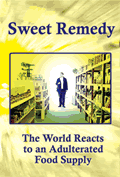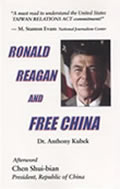IN DEFENSE OF PLASTIC
by
Tom DeWeese
October 10, 2010
NewsWithViews.com
I am fed up to my burning ears with the carte blanche castigation of plastic. Plastic is one of the greatest inventions ever, not only for modern society, but also for the environment. If plastic seems to now pose an environmental threat, it’s not plastic’s fault – but the fault of the environmental movement itself.
The use of plastic reduces the need for other natural resources. Plastic bags, cups, and plates save the need for more paper. It saves the trees the greens are so concerned about. Plastic tables and chairs and lamps also save the need for wood. Plastic bumpers on cars save the need for chrome, a natural mineral the greens worried over a couple of decades ago – plastic provided the saving solution. And the use of plastic in cars makes them lighter and therefore more fuel efficient. Plastic makes heart transplants possible. Plastic is used in a wide variety of medical devises, without which people would either die or be denied happy, useful lives. There is no natural wood, or paper or glass substitute.
It’s interesting to note that the current American obsession with bottled water came as a result of environmentalist scares over possible chemicals in municipal tap water. Green radicals like the National Resources Defense Council (NRDC) spewed horror stories of tap water full of rocket fuel, arsenic, germs, feces, lead, and pesticides. Plastic bottles provided the solution. Now the pendulum has swung and we’re all supposed to forget the earlier scare mongering over tap water and obey the new scare over water bottles. Crisis to crisis – whatever keeps up the green fundraising. It’s also interesting to note that one of the biggest promoters of the return to tap water is the National Conference of Mayors, the guys who produce tap water. New York City has spent $700 million of taxpayer dollars to get residents to stop using plastic water bottles. Many cities are now taxing each bottle used. A classic move – right out of the government handbook. Vilify it and then tax it.
Of course, so the mantra goes, plastic bottles and products are filling the land fills. Says one ad (by a water filter company with an ulterior motive to compete with plastic water bottles), America uses enough plastic water bottles in a year to ring the earth several times. Plastic bottles don’t degrade, they say, so they will be in the ground forever. The collectively acceptable answer, of course, is that we simply must ban them and any other use of plastic, if possible.
When one is driven by political correctness or globally-acceptable truth, one has a hard time looking past the “allowable” thought patterns to ask obvious questions. Are plastic bottles really a threat to landfills? Is there another way to dispose of plastic other than throwing it in land fills? Is there any other reason landfills are filling up and is there a solution? There are answers to these questions, but they will surely make the greens choke on their tofu as they read them.
The fact is, according to Angela Logomasini of the Competitive Enterprise Institute, plastic bottles are not filling up landfills. They represent less than one percent of landfill waste. She goes on to agree that they don’t degrade, “but nothing does.”
In addition, we have an artificial shortage of landfills because environmental regulations prevent the creation of new ones. We have no shortage of land in America and could open numerous new land fills to meet growing needs. Angela Logomasini agrees that we have plenty of landfill space and adds, “one large landfill 44 miles by 44 miles could manage 1,000 years of our waste. Simple enough, but completely politically in-correct. It’s much more acceptable to regulate and ban valuable products. That has become the American way.
And then there is this idea. Old fills, once full, could be used for other uses. In fact, just by researching the subject I found a list of 10 former landfills around the nation that have been converted to parks, golf courses, playgrounds, soccer fields, and shopping centers. One in Virginia Beach, VA, has been converted to a full blown city park called Mount Trashmore. We’re supposed to envision landfills as a no man’s land of devastation and waste for evermore (hence the need to block the creation of new ones.) But, again, it’s not true.
Finally, there is another possible solution to the disposal of plastic. Heat. Plastic products are produced and shaped through the use of heat. It melts at a very low temperature. Instead of throwing the bottles (and other plastic products) in the landfills, why not use some of that massive spending being used on propaganda to destroy the plastics industry, and instead use that money to develop and purchase heat-generating machines (without smokestacks) to be placed at every landfill to melt the plastic into reusable plastic liquid? Perhaps it’s not as satisfying as bullying us with anti-plastic police forces.
The latest to perpetuate the anti-plastic attack is the Whole Foods super market chain which is now forcing its suppliers to provide “sustainable” and recyclable packaging for their products or be banned from the store’s shelves. “We have switched to post-consumer recycled bottles for most of our store-brand personal care and nutritional supplement products and have implemented new responsible packaging for all of the company’s more than 1300 personal care product suppliers nationwide,” said Jeremiah McElwee, senior whole body coordinator for Whole Foods. The chain will also not use plastic carrier bags. Instead, it will use either paper bags or encourage customers to bring in their own reusable cloth bags. Whole Foods is a large enough force in the grocery market that its changes will force other chains to follow suit. That, of course, is its political strategy.
Whole Foods owner, John Mackey, is a full-fledged promoter of Sustainable Development as a political policy. He talks of corporations “doing good,” through a policy of “Conscious Capitalism.” I love the use of those words, “responsible;” “good,” “conscious.” Says who? Whether something is good depends on ones interpretation. Rather than a businessman, Mackey is ultimately promoting, his own political agenda on the buying public. That isn’t free enterprise, it’s a form of activism designed to covertly employ behavior modification techniques on the buying public.
In addition, Mackey’s drive to do good has a lot of unintended consequences. First, as reported here, he is perpetrating lies and prejudices to encourage our lawmakers to ban valuable products. That causes job loss in that industry. Second, he is taking away the right of choice by those who don’t accept his positions. Third, all so-called sustainable policies lead to one specific conclusion – higher prices for consumers; Fourth, his actions may well lead to endangering the health of many consumers.
For example, removing plastic bottles for shampoos and conditioners and replacing them with glass bottles will be a hazard in the bathroom when they inevitably fall on the floor. In San Francisco, where the city government has already banned the use of plastic bags, one resident wrote, “I remember when it began to rain last year while I was carrying my groceries home in a paper bag. As I chased my cans down the street, I cursed our idiot mayor and whoever among his stooges had decided to ban rainproof plastic bags in San Francisco. Paper is certainly biodegradable, for the process started even as I was carrying the bag home.” Where was her freedom of choice?
On a personal note, the banning of plastic water bottles can have a devastating effect on my own wife’s health. She has a severe physical reaction to the softened water used in most hotels. When we travel she has to purchase bottled water to make coffee, brush her teeth and taking her pills. Without it, her body swells.
The banning of plastic bottles for one man’s cause to “do good” creates danger for those left with no choices about their own lives.
| Subscribe to the NewsWithViews Daily News Alerts! |
Finally there is this growing hypocrisy from the do good faction. Up till now, stores have always provided the sacks (whether paper or plastic) for you to take home your purchases. That, of course, is a considerable cost for the store. Now, however, in the name of environmental protection, they are succeeding in getting consumers to purchase their own “reusable” bags at a cost of a couple of dollars each. Then you get to carry the bags around with you or stack them in your car, to always be prepared for a shopping spree. The fact is, the stores are encouraging this practice because it saves them money. But, of course, they can’t tell the consumer that, so they create the guilt factor about environmental protection. “Conscious Capitalism,” indeed.
� 2010 Tom DeWeese - All Rights Reserved













 Share
This Article
Share
This Article





